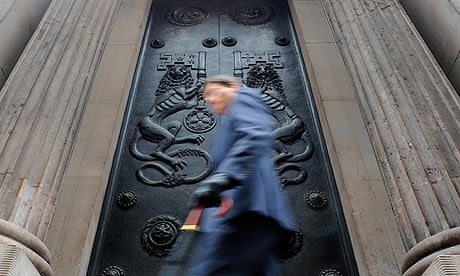Global economic recovery is fragile and incomplete, and governments and financial institutions should take action to avoid a relapse into recession, the Bank of International Settlements warned today.
Almost three years after the start of the global financial crisis, some developed economies and financial institutions are still dependent on government support, said the BIS, which acts as an umbrella body for central banks.
"The combination of remaining vulnerabilities in the financial system and the side effects of ongoing intensive care threaten to send the patient into relapse and to undermine reform efforts," it said in its annual report, published today.
Record-low interest rates, aimed at spurring economic growth, were keeping households and banks from reducing the huge debts that led to the credit crunch, the bank said. "Keeping interest rates near zero for too long, with abundant liquidity, leads to distortions and creates risks for the financial and monetary stability," it said.
Some economists oppose this view, claiming that tighter monetary policy and fierce budget cuts may cause a so-called "double-dip" recession.
Instead, the BIS says low interest rates inflate prices, increase risk-taking, delay the recognition of losses, discourage saving and distort investment decisions. For those reasons, policymakers "may still need to tighten monetary policy sooner than consideration of macroeconomic prospects alone might suggest," the bank said.
Banks are still vulnerable to further losses, as some have not recognised all their bad loans. The drivers of their recent profitability are also vulnerable – banks relied heavily this year and last on trading profits, from soaring commodity prices and fixed-income products such as loans and bonds.
Financial institutions could also face a liquidity problem when they need to refinance their debts if "sentiment turns adverse", the BIS warned. Although banks "have made some progress in repairing their balance sheets, this process is far from complete," it said. "Efforts to restructure and strengthen the financial system should continue."
The so-called "banker for central banks" also warned of "unsustainable" sovereign debt levels. Countries should slash their ballooning deficits and introduce structural reforms, regardless of the consequences, it said. "Such measures may have adverse effects on output growth in the short term, but the alternative of having to cope with a sudden loss in market confidence would be much worse," the BIS said.
Governments of high-deficit countries such as Britain, Greece and Spain said in February that they would prioritise growth over budget cuts to avoid falling back into recession. However, market turbulence and investors' lack of appetite for those countries' bonds led their governments to do the opposite, and implement the measures that the market pressed for. Greece was forced into an €110bn (£90bn) bailout by the European Union and the International Monetary Fund.
Countries needed to regain market confidence in case they had to rescue a financial institution, it said. "The events coming out of Greece highlight the possibility that highly indebted countries may not be able to act as buyer of last resort to save banks in a crisis," the BIS warned.

Comments (…)
Sign in or create your Guardian account to join the discussion